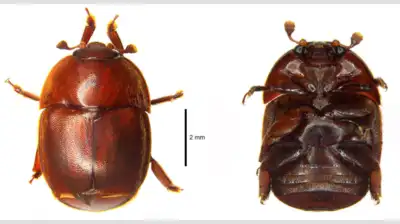Small Hive Beetle Threatens Indian Beekeeping
Recent discoveries have raised concerns for India’s beekeeping industry. The Small Hive Beetle (SHB), scientifically known as Aethina tumida, has been found in West Bengal. This marks the first recorded instance of this invasive species in India. The beetle poses a serious threat to honeybee populations and the broader ecological balance.
Identification and Characteristics
The Small Hive Beetle is a small, oval-shaped insect. It measures between 5 to 7 mm in length and is typically reddish-brown. Female beetles enter beehives through cracks, laying eggs that hatch into larvae. These larvae feed on honey, pollen, and bee brood, contaminating honey and leading to colony collapse.
Global Spread and Origins
Originally from sub-Saharan Africa, the SHB was first identified in 1867. It has since spread to various countries, including the United States in 1999, Australia in 2002, and several Asian nations in recent years. The rapid global movement of goods has facilitated the beetle’s spread, denoting the risks posed by invasive species.
Impact on Beekeeping and Biodiversity
The presence of SHB threatens not only honey production but also the livelihoods of beekeepers. The larvae’s feeding behaviour leads to honey contamination, making it unsuitable for consumption. Furthermore, SHB can invade colonies of various bee species, including Asian honeybees and bumble bees, disrupting essential ecological interactions.
Response and Mitigation Strategies
In light of this discovery, researchers are conducting laboratory studies to understand the SHB’s biology. The aim is to develop effective biosecurity measures. Experts emphasise the need for coordinated monitoring and containment strategies to protect native pollinators and the apiculture industry.
Ecological Implications
Invasive species like SHB can disrupt local ecosystems. They can dominate resources, spread diseases, and threaten native species. This can lead to a decline in biodiversity and the endangerment of local flora and fauna. The urgency for action is telld by the SHB’s potential to become unmanageable if not addressed promptly.
Month: Current Affairs - April, 2025
Category: Environment Current Affairs








